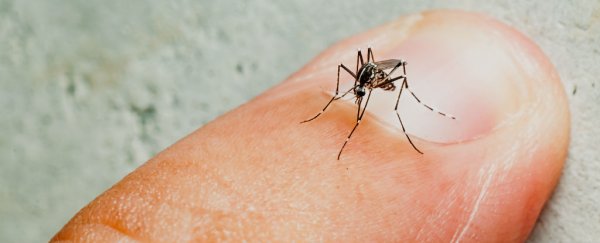Millions of genetically modified (GM) mosquitoes will soon be released into residential areas of the Florida Keys in the US to fight against two painful viral diseases. Well, that is if the British researchers can get approval amidst a Change.org petition against the experiment.
The experiment has been proposed to combat mosquito-borne viruses, dengue fever - also known as 'bone-break fever' - and chikungunya. The former is a leading cause of death in the world's tropic and subtropic regions, and the World Health Organisation estimates there could be as many as 100 million dengue infections worldwide every year. In late 2013, Dina Fine Maron reported for Scientific American that almost 40 percent of the world's population are now at risk of contracting dengue, and over the past few years, the US has become increasingly at risk, particularly along the coast of Florida.
"With climate change and globalisation spreading tropical diseases farther from the equator, storm winds, cargo ships and humans carry these viruses to places like Key West, the southernmost city in the continental U.S," Jennifer Kay reports for the Associated Press.
Chikungunya, which means "bent over in pain" in the African Makonde language, originated in Africa and Asia, and by 2013, had made its way to the Caribbean. As of this month, a total of 2,344 chikungunya virus disease cases have been reported from various US states, both locally transmitted in Florida, or in travellers returning from the Caribbean, the US Centres for Disease Control and Prevention report.
No effective vaccines or cures exist for either virus, and the Associated Press reports that mosquito controllers in Florida say they're running out of options to keep the female Aedes aegypti mosquitos that carry them - the males don't bite - at bay. They've tried different types of insecticides, but the hardy species has already evolved a resistance to four of the six types available.
The solution? A British biotech firm called Oxitec, which has come up with a method of breeding male Aedes aegypti mosquitos with sections of genes from the herpes simplex virus and E. coli bacteria, plus coral and cabbage. While this lab-constructed DNA is proven to kill mosquito larvae, there's no evidence to suggest that it can harm any other animals, including humans. "This is essentially using a mosquito as a drug to cure disease," Michael Doyle, executive director of the Florida Keys Mosquito Control District, told Kay at the Associated Press. Doyle says he's waiting on approval by the US Food and Drug Administration (FDA) to get the go-ahead for the experiment.
The idea is to release these GM male mosquitos into the Florida Keys, and when they mate with the wild females, their offspring will die off, leading to a dramatic decrease in the population. Oxitec has already tried out the experiment in the Cayman Islands three years ago, where they released 3.3 million genetically modified mosquitos over the course of six months. They reportedly suppressed 96 percent of the disease-carrying species they were targeting, and tried it again, successfully, in Brazil. They say they've now released 70 million GM mosquitoes in several countries over the past few years and have received no reports of human impacts due to bites or synthetic DNA.
But, of course, there's a problem with carrying out the experiment in the US, and that's the often negative public perception of genetic modification. Some people are more afraid of the GM mosquitos than they are of the threat of contracting dengue or chikungunya, and criticise Oxitec for not making it clear in their previous overseas experiments that a few stray GM females could slip through the cracks in the lab and end up biting the public after release.
And the issue with this (if GM females do actually slip through the cracks) is that some people aren't comfortable with the possibility that a bite could pass on GM DNA, even if there's no evidence to suggest that it could be harmful. There's now a Change.org petition against the GM mozzies' release with more than 140,000 signatures on it.
"I think the science is fine, they definitely can kill mosquitoes, but the GMO issue still sticks as something of a thorny issue for the general public," Phil Lounibos, a mosquito control expert at the Florida Medical Entomology Laboratory, told the Associated Press. "I'm on their [Oxitec's] side, in that consequences are highly unlikely. But to say that there's no genetically modified DNA that might get into a human, that's kind of a grey matter."
It's now up to Oxitec to not only prove to the American public that is this best solution to Florida's dengue and chikungunya risk, but that the involvement of a genetically modified organism is an entirely safe move.
Source: The Associated Press
